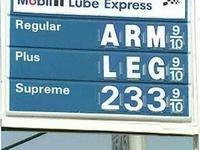Political Pandering Not an Acceptable Response to High Gas Prices
Attention fellow politicians and political aspirants, repeat after me: I will not use sky-high gas prices to engage in cheap political pandering. Repeat until this message sinks into that gray matter inside your skull.

We've all seen the Democrats continuously call for tapping the Strategic Petroleum Reserve despite the miniscule impact it would have--and a short one at that, as it has less than a 90-day supply of oil--as well browbeating oil company executives--which may give a lot of pleasure to politicians who parade these people before their legislative or congressional committees and, before the TV cameras, call these people the lowest form of human scum. We know what to expect from a party of anticapitalist demagogues who have kowtowed to radical tree huggers and contributed to the astronomical oil prices we now face.
So why are Republicans now trying to pander as well? Just as much as I despise these cheap shots by the Dems, I also equally despise attempts by some Republicans at proposing things like gas tax holidays. When gas is almost $3 a gallon, a nickel or dime doesn't mean much. Gas taxes don't affect the fact that crude oil costs $65 a barrel because of high demand from the Red Chinese and futures market speculators that have inflated oil prices by pricing oil today based on what it might cost in the future.
Today's installment of pandering from my side of the aisle comes from state Senator Vic Sprouse and Delegate Ron Walters, both of Kanawha County. Today's Charleston Daily Mail reports that they would like to suspend increases in the state gas tax based on the wholesale gas sales tax formula, which is 5% of the average wholesale price of gas. Since the wholesale gas sales tax formula was enacted by the Legislature in 1983 it has been 4.85 cents a gallon except for 2002, when it increased to 5.15 cents, and this year when it increased to 6.5 cents.
Another reason why any cut in the gas tax is a bad idea is that gas taxes are the primary source of highway funding in West Virginia and most other states. We have decided to fund highways with gas taxes, registration fees (which, in this state, are quite a bargain at only $30 per year for most cars), etc., because these taxes and fees closely represent a user fee for the service of public highways. Article VI, Section 52 of the state Constitution provides that all gas taxes and vehicle registration fees must be used for highways.
In West Virginia, our state highway funds are spent not only for new construction (most of which receives a 4-1 federal match) but also maintenance of over 40,000 miles of existing roads--most of them small local roads. Unlike some other states, we don't perpetrate the charade of low state taxes for highway purposes only to shift the responsibility of local road maintenance to county and other local governments who must then impose their own taxes for such purposes. Nor do we do like Kentucky and let the snow melt naturally and close the schools for 2 weeks at a time when it snows. Except for local streets in municipalities, the state Division of Highways paves the roads, plows the snow, mows the weeds, and digs the ditches. On most of these routes, the entire cost is paid by the state (federal funds only pay for Interstates, US numbered routes, and select state routes, and only part of the cost when they do).
West Virginia is not awash in gas tax revenues. According to the state's Comprehensive Annual Financial Report for 2003 (Adobe Reader required), gas tax collections increased from $275 million in FY 1994 to $296 million in FY 2003. Indeed, the total increase over this ten-year period was only 7.6% while the Consumer Price Index--the official measure of inflation in the United States--increased by 24%. Essentially, the state's gas tax collections fell by 14% when adjusted for inflation over this period. Had our gas tax collections increased just at the rate of inflation, we should have had $45 million more in FY 2003, not to mention other years.
The sad truth of the current gas price situation is something no politician wants to say for fear of an opportunistic opponent loose with the truth: Short of discovering practices in the futures markets that have significantly inflated oil prices and halting those practices--something which, if possible, could only be done at the federal level--there is virtually nothing that the political class can do to bring short-term gas price relief. Gas tax cuts will likely only be consumed by future gas price increases. In the long term, we should be producing more oil and gas, as the current prices are the product of increased demand. Current technologies permit oil drilling in virtually any place, even environmentally sensitive areas like offshore along the California cost and Florida gulf coast. Until the fuel of the future, cars that can use it, and a reliable and efficient production and delivery system are all developed, oil is here to stay.
 Today's
Today's 

 Senate Finance Committee Chairman Walt Helmick just can't help himself. Day after day, he repeats the same self-contradicting talking points in opposition to any and all tax cut proposals: Pay the pension debts first--all of them--then and only then even consider cutting taxes. Today, his message appears in the Beckley Register-Herald (article no longer available online). Do Helmick and his cohorts in the legislative leadership of the Ruling Party really think we, the people of West Virginia, believe them? Or do they think we all have "STUPID" written on our foreheads and will buy this load of male bovine excrement, let the Legislature forego cutting taxes with a promise of appropriating that money toward accelerated debt reduction, and then watch as the Legislature passes spending increases with the money they said they would apply to accelerated debt reduction?
Senate Finance Committee Chairman Walt Helmick just can't help himself. Day after day, he repeats the same self-contradicting talking points in opposition to any and all tax cut proposals: Pay the pension debts first--all of them--then and only then even consider cutting taxes. Today, his message appears in the Beckley Register-Herald (article no longer available online). Do Helmick and his cohorts in the legislative leadership of the Ruling Party really think we, the people of West Virginia, believe them? Or do they think we all have "STUPID" written on our foreheads and will buy this load of male bovine excrement, let the Legislature forego cutting taxes with a promise of appropriating that money toward accelerated debt reduction, and then watch as the Legislature passes spending increases with the money they said they would apply to accelerated debt reduction?

